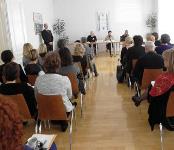 The representatives of the Children’s Rights Ombudspersons’ Network in South and Eastern Europe (CRONSEE) and the organisation Save the Children International (SCI) held a Thematic Meeting on 28 october 2015 in Osijek to discuss and exchange ideas on the position and role of ombudsmen for children concerning the implementation of the Third Optional Protocol to the Convention on the Rights of the Child. In addition to the Protocol, also discussed were the experiences and practice of the members of the CRONSEE network and the SCI regarding the current refugee crisis and its impact on the protection of the rights of refugee children.
The representatives of the Children’s Rights Ombudspersons’ Network in South and Eastern Europe (CRONSEE) and the organisation Save the Children International (SCI) held a Thematic Meeting on 28 october 2015 in Osijek to discuss and exchange ideas on the position and role of ombudsmen for children concerning the implementation of the Third Optional Protocol to the Convention on the Rights of the Child. In addition to the Protocol, also discussed were the experiences and practice of the members of the CRONSEE network and the SCI regarding the current refugee crisis and its impact on the protection of the rights of refugee children.
The Conclusions, based on presentations and discussions, present the conditions in the member countries of the CRONSEE network and the current social situation, including the proposals for the protection of the best interests of children.
Conclusions
1) The Third Optional Protocol to the Convention on the Rights of the Child allows children from the states that have ratified it to submit complaints regarding violations of their rights to the UN Committee on the Rights of the Child in cases when they have not been provided adequate protection at the national level. The Protocol came into force in April 2014 and as at the date of this Meeting it was signed by 50 and ratified by 20 states (including Albania and Montenegro as members of the CRONSEE network). The Republic of Croatia signed the Protocol on 27 December 2013, but it has not ratified it. The representatives of the CRONSEE network agreed to continue to encourage the governments of their countries to sign and ratify the Third Optional Protocol as well as to implement it in line with the best interest of the child.
Therefore, ombudsmen institutions should:
• encourage the governments of the member countries of the CRONSEE network to ratify the Third Optional Protocol;
• promote and educate children and adults on children’s rights and the ways to protect them, which also concerns the Third Optional Protocol;
• develop the possibility to implement and provide free legal aid to children;
• examine methods of cooperation with the Committee on the Rights of the Child and of balancing the practice in cases when the Committee requests consultations with an ombudsman regarding a specific complaint submitted by a child.
2) The second half of 2015 was marked by the exodus of large numbers of refugees from Syria, Afghanistan, Pakistan and other countries and their crossing through South East Europe. For that reason, discussed at the Meeting were the current refugee crisis and the activities and experiences of ombudsman institutions in this regards, as well as the activities of the organisation Save the Children International, which invested significant efforts in the protection of the rights of migrant children. The participants of the Meeting agreed that children were the most vulnerable group in the refugee crisis and the one that was exposed to the highest risk. The representatives of ombudsman for children’s offices from member countries of the CRONSEE network through which refugees travel and the representatives of the organisation Save the Children International that visit refuge reception centres raised their concerns regarding the insufficient coordination of activities of the countries on the refugee route.
It is therefore necessary:
• that all countries facing this huge problem invest the strongest possible efforts in children protection;
• to recommend to the governments of the member countries of the CRONSEE network on the refuge route to improve the exchange of information and coordination in protecting the rights and fulfilling the needs of refugees and providing timely assistance and protection to children.


